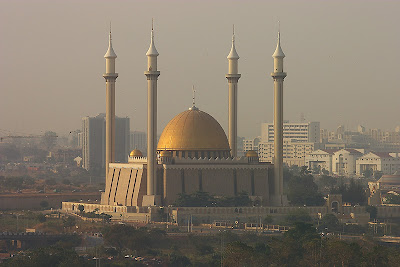TONIGHT ON THE TERRORDOME: Ali Mazrui on the African Renaissance

6 PM Mountain Time
CJSR FM88.5 Edmonton
cjsr.com worldwide
To anyone well-versed in history, it’s no surprise that Africans built the foundations of the ancient world through the Nile Valley Civilisations of Sudan and Egypt.
Nor is it a surprise that Africa blossomed with later great civilisations such as that of Ethiopia, Mali, Songhay, Ghana, the Yoruba and Zimbabwe and so many others.
To those who know more than imperial histories, it’s no shock that Africa created and disseminated arts, mathematics, philosophy, poetry, religions, textiles, painting, medicine and more.
 But no matter how great was the past, the African present is sadly over-determined by conditions of misery.
But no matter how great was the past, the African present is sadly over-determined by conditions of misery.
The roots of that misery lie in the Maafa, the three waves of the holocaust against Africa: European and Arab human trafficking of scores of millions of people, the resulting deformation of those civilisations' development and progress, and imperialism that saw Europeans militarily occupying every country on the continent--in some cases for centuries.
Given those conditions, talk of an African renaissance probably is a surprise.
Yet such talk has been embraced by numerous highly esteemed figures. One such person is former South African president Thabo Mbeki who popularised the expression more than a decade ago. Another is the acclaimed Kenyan academic Dr. Ali Mazrui.
 To most North Americans, Ali Mazrui is best known for his ground-breaking PBS, BBC and Nigerian Television Authority documentary series The Africans: A Triple Heritage, which aired in the 1980s.
To most North Americans, Ali Mazrui is best known for his ground-breaking PBS, BBC and Nigerian Television Authority documentary series The Africans: A Triple Heritage, which aired in the 1980s.
That series examined African histories in light of the collision and fusion of African, Arab and European civilisations.
Such challenging and sophisticated presentations of complex knowledge through popular media are part of the reason that Mazrui has been recognised as among the world’s top hundred public intellectuals. Born in 1933, Ali Mazrui earned his doctorate at Oxford in 1966, and later taught at Makerere University in Kampala, Uganda, the University of Michigan, the State University of New York, the University of Guyana, McGill University, Oxford University, Harvard and many others.
Born in 1933, Ali Mazrui earned his doctorate at Oxford in 1966, and later taught at Makerere University in Kampala, Uganda, the University of Michigan, the State University of New York, the University of Guyana, McGill University, Oxford University, Harvard and many others.
Mazrui has held three concurrent faculty appointments at the University of Jos in Nigeria, at Cornell University, and at the Jomo Kenyatta University of Agriculture and Technology in Nairobi.
 Mazrui has also been the President of the African Studies Association, USA, and Vice-President of the International Political Science Association, Special Advisor to the World Bank, and a board member of the American Muslim Council in Washington, D.C.
Mazrui has also been the President of the African Studies Association, USA, and Vice-President of the International Political Science Association, Special Advisor to the World Bank, and a board member of the American Muslim Council in Washington, D.C.
He’s served on the editorial boards of more than twenty international scholarly journals, and is the author or co-author of more than twenty books, including:
Africanity Redefined: Collected Essays of Ali A. Mazrui
On Heroes and Uhuru-Worship: Essays on Independent Africa and
Euro-Jews and Afro-Arabs: The Great Semitic Divergence in World History.
 Tonight, from a speech delivered on April 24, 2000 at Stanford University in Palo Alto, California, Ali Mazrui analyses the necessary the pillars of any proposed African renaissance: the combination of the African, Arab and European cultures, the role of women and modernization.
Tonight, from a speech delivered on April 24, 2000 at Stanford University in Palo Alto, California, Ali Mazrui analyses the necessary the pillars of any proposed African renaissance: the combination of the African, Arab and European cultures, the role of women and modernization.
Mazrui also examines when each of the pillars can be an impediment to a brighter African future.
For more information, visit his website at alimazrui.com.


Comments